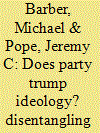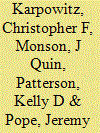|
|
|
Sort Order |
|
|
|
Items / Page
|
|
|
|
|
|
|
| Srl | Item |
| 1 |
ID:
165401


|
|
|
|
|
| Summary/Abstract |
Are people conservative (liberal) because they are Republicans (Democrats)? Or is it the reverse: people are Republicans (Democrats) because they are conservatives (liberals)? Though much has been said about this long-standing question, it is difficult to test because the concepts are nearly impossible to disentangle in modern America. Ideology and partisanship are highly correlated, only growing more so over time. However, the election of President Trump presents a unique opportunity to disentangle party attachment from ideological commitment. Using a research design that employs actual “conservative” and “liberal” policy statements from President Trump, we find that low-knowledge respondents, strong Republicans, Trump-approving respondents, and self-described conservatives are the most likely to behave like party loyalists by accepting the Trump cue—in either a liberal or conservative direction. These results suggest that there are a large number of party loyalists in the United States, that their claims to being a self-defined conservative are suspect, and that group loyalty is the stronger motivator of opinion than are any ideological principles.
|
|
|
|
|
|
|
|
|
|
|
|
|
|
|
|
| 2 |
ID:
105421


|
|
|
|
|
| Publication |
2011.
|
| Summary/Abstract |
By winning the presidency and strengthening its majority in both chambers of Congress, the 2008 election gave control of the government to the Democratic Party. However, as the 2010 election season unfolded, the news for the Democratic Party could not have been much worse. Economic conditions had not improved dramatically. A bitter and lengthy fight over health care reform signaled to citizens that little had changed in how Washington, DC, governed. The stimulus package and its impact on the federal debt caused unease in a segment of the electorate that was concerned with the size of government. In this context, observers of American politics began to take note of the number of citizens affiliating with, or at least expressing favorability toward, a loose coalition of groups known as the Tea Party movement. Tea Party rallies began to occur throughout the United States, seeking to draw attention to the movement's primary issues.
|
|
|
|
|
|
|
|
|
|
|
|
|
|
|
|
|
|
|
|
|